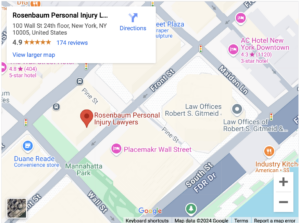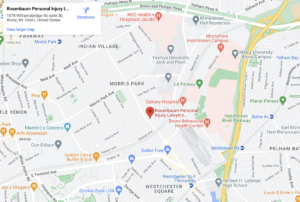Personal Injury FAQs

Being injured in an accident that was not your fault is stressful. It is also overwhelming and frustrating. Because of the negligence or wrongdoing of another party, you have sustained physical injuries and financial losses. Now you are forced to fight for reimbursement of your financial losses and compensation for your pain and suffering damages.
A personal injury lawyer helps individuals fight for just compensation from the party who caused their injuries. Personal injury attorneys also protect individuals from bad faith insurance tactics intended to deny and undervalue valid injury claims.
If you or a family member has sustained an injury in a car accident, construction accident, motorcycle crash, or other personal injury accident, understanding more about personal injury claims can help you decide what steps you need to take to protect your rights and best interests.
Table of Contents
What Do You Need to Know About Personal Injury Claims?
Ten personal injury FAQs that anyone who has been injured by another party should know are:
1. You Must Prove Liability Before You Recover Compensation for Your Damages

You must prove that another person caused your injuries to recover compensation from that person. For instance, before you can recover money for a premises liability claim, you must prove that the property owner knew or should have known about a dangerous condition that led to your injuries.
For a medical malpractice claim, you must prove that the doctor’s actions or inaction breached the standard of care, and you were injured because of the breach of duty.
If you cannot prove each of the legal elements for negligence or other fault-based claims, you are not entitled to compensation from the alleged at-fault party.
2. You are Entitled to Economic Damages
If you prove the legal elements for a personal injury claim, the party who caused your injury is responsible for your economic damages.
Economic damages are the financial losses caused by the accident. Examples of economic damages in personal injury claims include:
- Past and future cost of medical care and treatment
- Past and future loss of salary, benefits, wages, and other forms of income
- Decreases in future earning capacity because of permanent impairments
- Past and future cost of personal care
- Modifications to your home or vehicle because of a disability
- Travel expenses to and from medical appointments
Other out-of-pocket expenses may also be included in economic damages. Keeping detailed records and evidence of the financial losses increases the chance you receive full reimbursement for financial losses.
3. You are Entitled to Noneconomic Damages
An at-fault party is also liable for your physical pain, mental anguish, and emotional distress caused by the accident and your injuries. Noneconomic or “pain and suffering” damages also include a loss of quality of life and psychological injuries.
You can also receive compensation for scarring, disfigurement, disabilities, and permanent impairments.
Valuing non-economic damages can be challenging. Placing a value on your pain can seem impossible. An experienced personal injury lawyer uses the facts in your case and your experiences to maximize the value of your non-economic damages.
4. There are Deadlines for Filing Personal Injury Lawsuits

The New York Statutes of Limitations limit your time to file a personal injury lawsuit. If you do not file your lawsuit before the deadline expires, you cannot initiate legal action against the person who caused your injury. Most personal injury claims in New York have a three-year deadline for filing a lawsuit.
That deadline includes caused involving product liability claims, motorcycle accidents, and many other personal injury cases.
However, some types of personal injury claims have different deadlines for filing lawsuits. Medical malpractice claims have a deadline to file lawsuits of two years and six months from the malpractice date or the last continuous treatment by the at-fault party. Wrongful death claims have a two-year statute of limitations for filing lawsuits.
Always talk with an injury lawyer as soon as possible to avoid problems with deadlines. You do not want to lose your right to recover money from the party who caused your pain and suffering.
5. You can Recover Compensation Even if You are Partially to Blame
The other party might accuse you of contributing to the cause of your injury. For example, a driver might accuse you of stepping out in front of his car, thereby causing a pedestrian accident.
Even though you might have contributed to the cause of the accident, you can still recover compensation for your damages.
New York’s contributory negligence laws state that damages are reduced by the portion of fault attributed to the victim.
In other words, under the state’s pure comparative fault system, your compensation is reduced by the percentage of blame assigned to you for the cause of the accident. Being partially at fault does not bar your recovery completely. It just affects how much money you can ultimately recover when your case is resolved.
6. You can Hire a Personal Injury Attorney Without Paying a Retainer Fee
Many people worry about hiring a personal injury lawyer when they are out of work and facing enormous medical bills because of an accident. The good news is that most personal injury cases are based on a contingency fee. A contingency fee means that you do not pay any attorneys’ fees when you retain the law firm.
The attorneys’ fees are based on a percentage of the settlement amount or jury verdict. Your lawyer is paid when you get paid.
You do not owe any attorneys’ fees for the case unless the attorney recovers money for your claim.
7. How Long Does it Take to Settle a Personal Injury Claim?
Each personal injury claim is unique. Several factors impact how long it takes to settle an injury case. The leading factor is the duration of your medical recovery.
Settling an injury claim before completing medical treatment generally results in a lower settlement amount.
It is impossible to know the full extent of your damages until you complete your treatment plan.
You could sustain a disabling condition, which significantly increases the value of your injury claim.The complexity of the case and the area of law related to the case can also impact the time it takes to resolve a personal injury claim. Cases involving multiple parties and government entities can take longer to settle because there are many legal issues to work through before settling the claim.
Your personal injury lawyer works diligently to settle your accident claim as quickly as possible without jeopardizing your claim.
8. Will I Have to go to Court for My Personal Injury Case?
Most injury cases do not go to trial. Most cases are settled without filing a lawsuit.
However, if the other party refuses to accept liability or negotiate in good faith, your lawyer may recommend filing a personal injury lawsuit. If so, you will likely testify in court to help establish liability and damages.
9. When Should I See a Doctor After an Accident?
It is in your best interest to see a doctor immediately after an accident or injury. Seeking prompt medical treatment can prevent your injuries from becoming worse.
However, prompt medical care also improves your chance of receiving full compensation for damages in an injury claim.
You must have medical evidence to document your injuries. We must prove that the accident caused your injuries.
Delays in medical care can hurt your case. If you wait too long to go to a doctor after an accident, the insurance provider might argue that the accident did not cause your injuries. If you had been injured, you would have seen a doctor right after the accident.
10. When Should I Call a Personal Injury Lawyer?
It is best to call a personal injury lawyer as soon as possible after an accident. You want to protect your legal rights and avoid mistakes that could hurt your claim. A personal injury attorney can help with both of those goals.
Your attorney can begin collecting and preserving evidence to prove the other party is responsible for causing your injuries. Your lawyer handles all communication with the insurance company. The attorney also searches for other parties who could also be liable for your injuries.
While you are focusing on healing from your injuries, your personal injury attorney focuses on getting you the money you deserve. Your lawyer fights to hold the parties who caused your injury financially responsible. Your attorney also provides the guidance and support you need as you continue to recover from a devastating event.
If you have additional questions or concerns, do not hesitate to contact the NYC personal injury attorneys at Rosenbaum Personal Injury Lawyers, for a free consultation at (212) 514-5007. Get the advice you need to make the best decision for you and your family.



